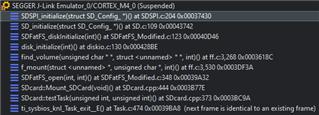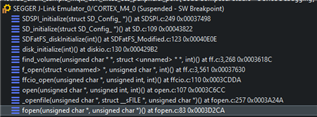Other Parts Discussed in Thread: SYSCONFIG, , TM4C1294NCPDT, SEGGER
Hello Ti Community,
I am not using the boosterpack and have three pins selected from SSI2 in sysconfig for SD SPI interface. I have a CS pin that is not part of the SSI2 interface. Non of the simplelink examples for MSP432E401Y launchpad work for me with the custom pinconfig. It cannot perform R/W operations to sd card as well.
I applied the modification in the linked post but had no luck getting a handle that is not null.
Any tips on how to overcome this?
Thanks,
Utsav











